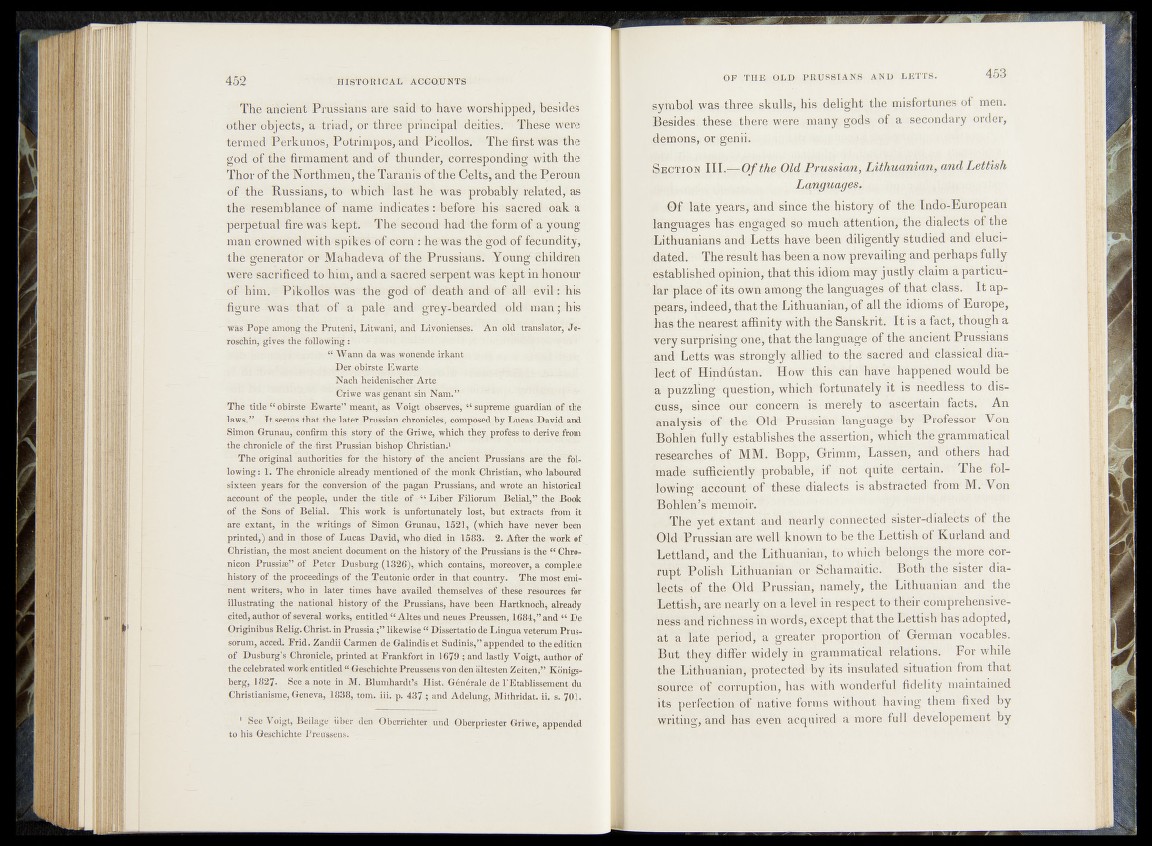
The ancient Prussians arè slïd to have" worshipped*;- BfesMfeS'
other objects, a triad,, Of three principal dhitfes." Thèse’ werfe
tepnfjëd Perkunos, Potrin||ïbs; and PicolIo&M-The first-was the
god of the firmament and of thunder, corresponding'With the
Thor of the 3N orthmeh, the Taraiiis Of the Celts, and the Peroun
oir the Russians, to w h ic h ^R ^ h e ; was probably, related, as
the resèihblanee of name indicates ^before- his*’sacred oak a
perpetual fire was kept. The second had the form of a ‘young-
man crowned with spikes of corn : he was thè godïôfïfeeundliÿ,
thê gehefatöf br Mahadbva bfitfee Prussians.' Young'ehildren
wêre sacrificed to him, and a Sâcréd serpent was kept in honour
of him. Pikollos was th e ;god of death and of alHê^ikiVhis
figure was- t h a t o f u pale and s^g^iyihearded old man glatis
Was Pope among Ibe Ffutenî, LitWani,and hiiflftiaÉè'Sï* ‘
roschin, gives the foUôwing :
u W ann da was wonendf virl^aäpttii ;;
. P e r(p.birstje Ewarte
. Nach heidemscher Arte
Griwe was gênant sm'Närfi.1’
The title' “ ohirste Ewarte” meant, as Voigt observes, “ supreme ^guardian Df .the
laws.” I t seems that the later Prussian chronicles, composed by Lucas.David and
Simon Grunau, confirm this story of Uie.Griwe, which they profess to derive from
the chronicle of the first Prussian bishop Christian.'
The original authorities for the history of the ancient Prussians are the following
: 1. The chronicle already mentioned of themonk ‘Christian,; who laboured
sixteen years for the conversion o f the pagan Prussians, and wrote an .historical
account of the people, under the title of Liber Filiorum Belial,” the Book
of the Sons of Belial. This work is unfortunately lost, but extracts from it
are extant, in the writings of Simon Grunau, 1521, (which have never been
printed,) and in those of Lucas David, who died in 1583. ,2. After the work of
Christian,.the most ancient document on the history of the Prussians is; $ip U:Chro-
nicom Prussiæ” öf Peter Dusburg (1326)^which contains, moreover, a complete
history of die proceedings of the Teutonic order in diat country. The most eminent
writers, who in later times have availed themselves of these resources for
illustrating the national history of the Prussians, have been Hartknoch, already
cited, author of several works, entitled “ Altes und neues Preussen, 1684,” and “ De
Originibus Relig. Christ, in Prussia likewise “ Dissertatio de Lingua veterum Prus-
sorum, acced. Frid. Zandii Carmen de Galindiset Sudinis,” appended to the edition
of Dusburg’s Chronicle, printed at Frankfort in 1679 ; and lastly Voigt, author of
the celebrated work entitled “ Geschichte Prèussens von den ältesten Zeiten,” Königsberg,
1827- See a n o d in M. Blumhardt’s Hist. Générale de l'Etablissement du
Christianisme, Geneva, 1838, tonj. iii. p* 437 ; and Adelung, Mithridat. ii. s. 701.
See Voigt, Beilage'-über den Oberrichter und Oberpriester Griwe, appended
to his Geschichte Pretfäsens. *
jL^pbol was three?, skulls', bis delight the misfortunes of men.
Llesides.. these, t^,e.f§,were many g°ds of a ^secondary order,
demons, o r,g en i|&
S ection III.—jC}/’ the Old P russian, Lithuanian,, and Lettish
Languages.. u
; Of late yeacfe/undi&ilice; the'history of the [ndo-European
languages hals ;eng^%]^%s^mueh8'lattention, the dialects of the
^Lithuanians a i || Letts have'been diligef^ljstudied and elucidated.
The result has-been a now prefadirf^ and perhaps fully
establ-ished'bpinion, that-this idiom maj^jpslly claim a partifeif-
lar place ©frits wnsateong the languages of that clrfsfct I t appears,
indeed, that the Lithuanian,K>f al'l ihe id i< ^ |||f Europe,
hapf thedearestaffinity with the’Sanskrit. It is a fact, though a
very surprisingone, that th#lUbg#UgS%frthe an&lf n t Prussians
_and Letfh'Was strongly* a-Miedto andf’fcl&ssical aiaf
c t of Hindulfen. How* thi#%£?ri have happ'ehWvv'o'uld be
a puzzling“ qileltion, whichlToftun^lefy it is needlesfs^to discuss,
csinee our concern is" merely to -ascertain ’ fa c to r An
^Uriliiysis of1 the 'OldI Priis'sian*Ian|£tiSgfe'"by1 ;Prdffe'sslir "Von
Bohlen fully Establishes thfe a§#^rtioris; which ^ grammatical
researches of MM, Bopp, Grimm, ’Lasiejn/' and others had
made sufficiently probable, 5 if'n o t qadffe certain. The; fol-
^fbwin'g' account of these dialects - ife^fib^tracted from M.'Von
Bohlen’s memoir.
^The yet extant and n e a r ly f if e 'd f s ^ te r - d ia le c ts of the
Old Prussian are well known to be the Lettish of Kurland and
Lettland, and the Lithuanian corrupt
Polish L ith u an ian ^ ^S p h a '^ iti^P Both| tte'slater dia-
lects' of the Old Prussian, naibpl^, the Lithuanian and the
LettisKj are nearly oira level in respfect to their ’^fhjjrehensi've-
iies§'and richMs'sin words, exceptfHk the'Eettish Bas adopted,
at a late p e ripd,a proportion German vocables.
But ffiipdiffer widely in grammatical relations^ ' For while
the Lithuanian, protected by:its#i®sUlateffisituatioil: from that
source of corruption," has5 with wonderful fidelity maintained
its perfection of native forms without having them fixed by
writing, and has evfen acquired a more full' developement by